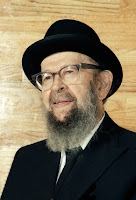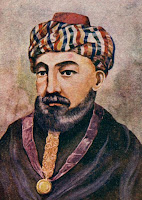We are currently in the Jewish month of Av, the month
devoted to mourning the destruction of the Holy Temples in Jerusalem – which culminates in the fast of Tisha
B’Av – and to our faith that God will eventually comfort us – as expressed in the
seven haftaros read each Shabbos between Tisha B’Av and Rosh HaShana. The
month of Av is followed by Elul, the month devoted to teshuva (repentance)
in preparation for Rosh HaShana and Yom Kippur.
What is the meaning of this sudden shift from the month of
tragedy and mourning to the month of penitence and rapprochement between Man
and God? To understand this we need to gain a deeper insight into the basic
message of Av.
The Midrash (Eicha Raba 1:1) states:
Three [prophets] prophesied using the term “eicha”:
Moses, Isaiah, and Jeremiah. Moses said, “How (Eicha) can I bear this
people alone…” (Deut. 1:12). Isaiah said, “How (Eicha) has the faithful
city become a harlot…” (Isaiah 1:21). Jeremiah said, “Alas! (Eicha) She
sits in solitude…” (Lamentations 1:1).
R’ Levi said, “This is analogous to a noble-woman that
had three servants, one saw her when she was in comfort, one saw her in her
licentiousness, and one saw her in her disgrace. Similarly, Moses saw Israel in their
honor and comfort and said, “How can I bear this people alone…”, Isaiah saw
them in their licentiousness and said, “How has the faithful city become a
harlot…”, and Jeremiah saw them in their disgrace and said, “Alas! She sits
alone…”
These verses of Eicha are all read in the month of Av
– the verses in Deuteronomy and Isaiah are read on the Shabbos before Tisha
B’Av and the book of Lamentations is read on Tisha B’Av – and, taken
together, they give us a key to the basic message of Av. The Elef
HaMagen (Commentary on the Torah by Rav Eliezer Papo, d. 1824, author of the Pele Yo'etz) draws a
connection between these three verses of Eicha and a passage in the
Talmud (Yoma 35b):
A poor man, a wealthy man, and a wicked man are brought
before [the heavenly court for] judgment. They say to the poor man, “Why didn't
you study Torah?” If he responds that he was too poor and was preoccupied with
his livelihood, they say to him, “Were you more impoverished than Hillel?”
[Hillel the Elder, one of the greatest sages of the Talmud, was also an
extremely poor man.] …
They say to the wealthy man, “Why didn't you study
Torah?” If he responds that he was wealthy and was preoccupied with his
financial obligations, they say to him, “Were you more wealthy than Elazar ben
Charsom?” [Rabbi Elazar ben Charsom was a prominent sage who was also extremely
wealthy.]…
They say to the wicked man, “Why didn't you study Torah?”
If he responds that he was very good-looking and was [therefore] preoccupied by his
desires, they say to him, “Were you more beautiful than Joseph HaTzadik
(the Righteous)?” [Joseph, the son of Jacob, was extremely beautiful and was
severely challenged in this regard when he lived in the home of Potiphar in Egypt.]…
Thus we find that Hillel obligates the poor, Rabbi Elazar
ben Charsom obligates the wealthy, and Joseph HaTzadik obligates the wicked.
The Talmud gives three categories of rationalizations – the
excuses of poverty, wealth, and temptation – that people rely upon to deny
their responsibility for their moral failures. Almost every excuse that we make for ourselves falls into one of these three categories. These three excuses are paralleled in the three
verses of Eicha. Moses spoke of the Jewish people in their time of
success, paralleling the challenge of wealth; Isaiah spoke of the Jewish people
in their time of sin, paralleling the challenge of temptation; and Jeremiah
spoke of the Jewish people in their time of suffering, paralleling the
challenge of poverty.
 |
| Rav Avigdor Miller |
The Midrash (
Eicha Raba 1:1) points out the
connection between the word
Eicha and the word
Ayeka (both words
are spelled identically) in Genesis 3:8, when, after the sin of eating from the
Tree of Knowledge, God calls out to Man, “
Ayeka?" - "Where are you?” What
exactly was God asking? God certainly knew exactly where Adam and Eve were
hiding! Rav Avigdor Miller explains:
Every sinner hides from Hashem… behind
self-justifications and self-deceptions. ...all sinners are actually hiding from Him behind their barricades of self-deception and self-justification. ... Hashem calls to the Man: “Where
are you?” meaning: Reveal yourself to Me, by removing the barricades of
self-justification and false reasoning behind which you attempt to hide from
Me.
The cry of Eicha – How can it be! – alludes to that
original call of Ayeka – Where are you? – in which God calls us to stop
deceiving ourselves and return to Him. The tragedies we mourn in the month of Av
are repetitions of that call, intended to shake us out of our complacency and
force us to accept responsibility for our actions. The message of Av is
precisely this, that it was our failures – failures that we continue to repeat –
that brought about these tragedies, and that we must recognize this and
acknowledge our own power to change our behavior. We are not slaves to our
circumstances; as human beings we are fundamentally free to control our
actions, and we therefore bear the responsibility to do so.
 |
| Maimonides |
Maimonides devotes two full chapters of his laws of repentance to the topic of free-will (
Hil. Teshuva 5:1-3):
Free-will is given to every human being. If he wishes to turn himself to the good path and to be righteous, he has the ability to do so, and if he chooses to turn himself to the bad path, and be wicked, he has the power to do so....
Do not think... that God decrees upon a person at the beginning of his existence whether he will be righteous or wicked. It is not so! Rather, every single human being has the ability to be as righteous as Moses our Teacher, or as wicked as Jeroboam....
This concept is a major principle and the pillar of the Torah and the Commandment, as it says (Deuteronomy 30:15), "See, I have placed before you today life and good, and death and evil." And it is written (ibid. 11:26), "See, I have placed before you today blessing and curse."
Maimonides concludes his discussion of free-will stating (Hil. Teshuva 7:1):
Since, as we have explained, every human being has free-will, a man should strive to repent and to cleanse his hands of his sins, so that he should die as a penitent and merit to the life of the world to come.
The recognition of our free-will and responsibility is of
fundamental importance as we enter the month of Elul – the month of teshuva
(repentance). As long as we deceive ourselves into thinking that our actions
are not within our control, teshuva is impossible. It is only after we
accept responsibility for our deeds that we can begin the process of teshuva.


